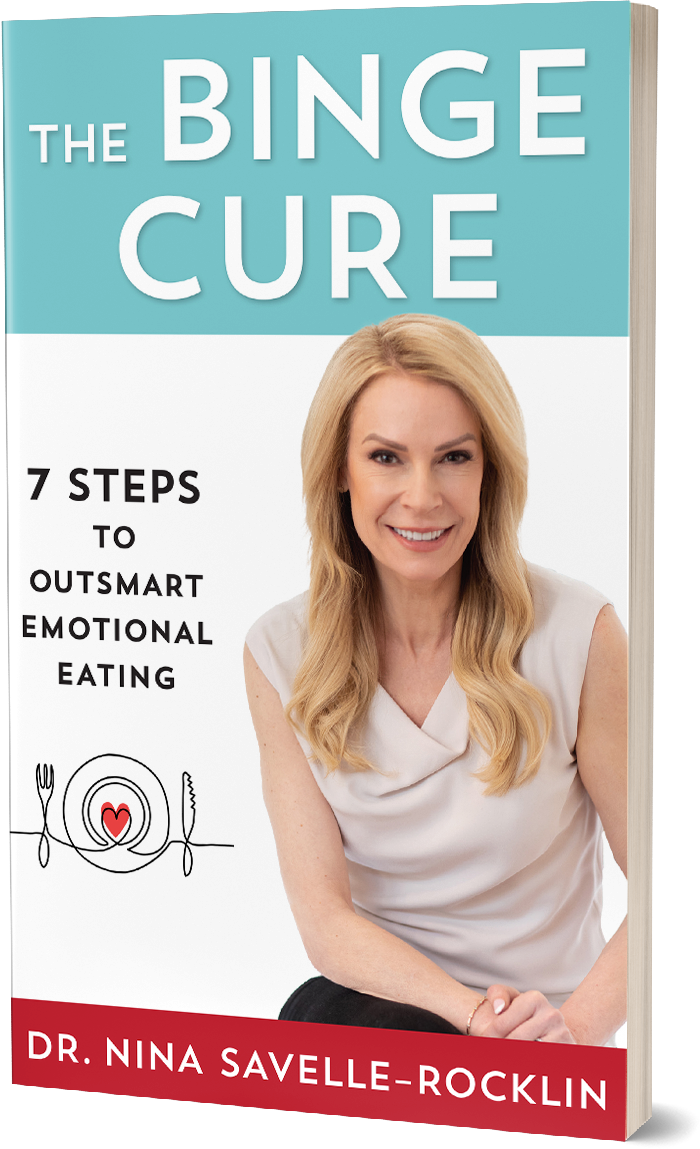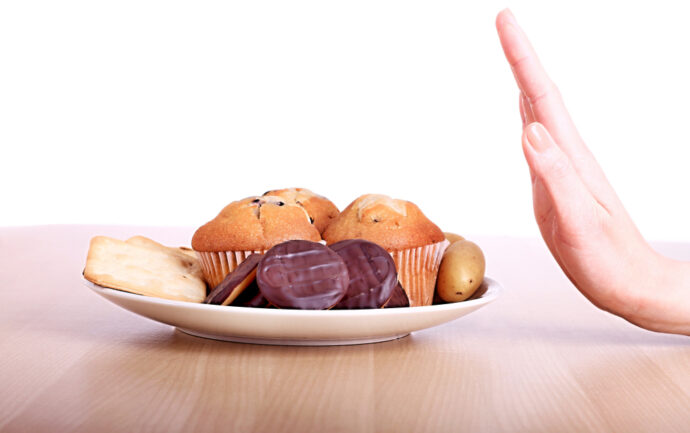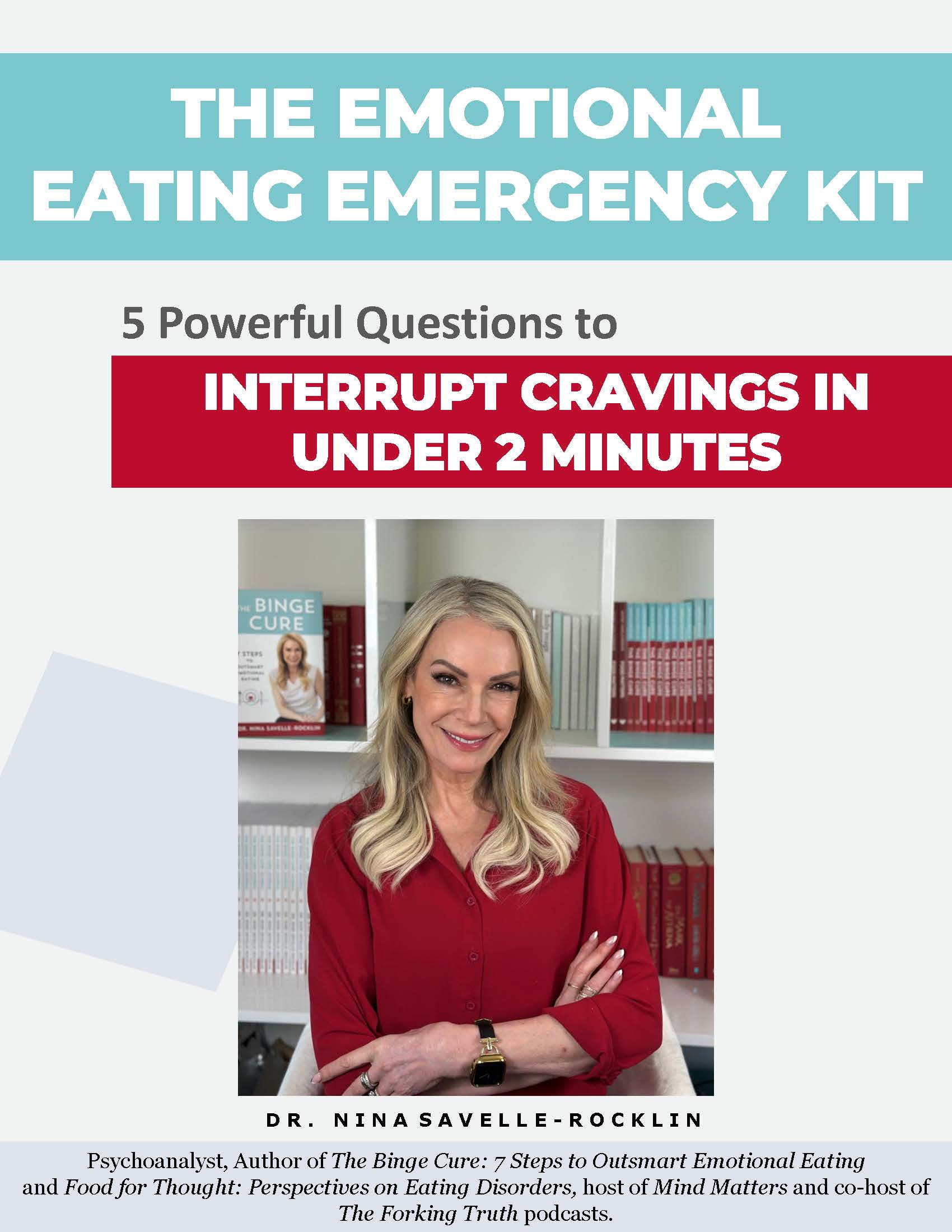Dr. Nina Savelle-Rocklin
Say Goodbye to Binge Eating Relapse
Table of Contents
- However, there are some common signs and symptoms that people with BED often experience:
- What is binge eating disorder relapse?
- Reasons for relapse
- Is it relapse or self-sabotage?
- Preventing Relapse
- Frequently Asked Questions:
Binge eating disorder (BED) is a type of eating disorder characterized by episodes of overeating or binging. Bingeing is defined as eating a large amount of food in a short period of time, often to the point of feeling uncomfortably full.
People with BED often feel that they can't control their eating and may eat even when they're not hungry. Bingeing episodes are typically followed by feelings of shame, guilt, and embarrassment.
The signs and symptoms of binge eating disorder can vary from person to person.

However, there are some common signs and symptoms that people with BED often experience:
Those include:
- Eating large amounts of food in a short period of time
- Eating even when you're not hungry or don't want to eat any more food
- Eating until you're uncomfortably full or feel sick to your stomach
- Frequently eating alone or in secret
- Feeling guilty, ashamed, or embarrassed after bingeing
- Experiencing feelings of low self-esteem or worthlessness
- Thinking about food all the time
- Missing social events or work due to bingeing
Binge Eating Disorder is the most common type of eating disorder in the United States, and it affects people of all genders, ages, and ethnicities. Many of those who struggle with bingeing don’t know they have a diagnosable and treatable eating disorder. They often think they lack willpower or control or believe they’re addicted to food.
The truth is that binge eating disorder is a negative coping strategy that involves eating as a way of dealing with difficulties in life.
The key to stop bingeing is to identify why you’re using food to cope, develop new ways of expressing yourself, and cultivate helpful self-soothing strategies. It’s a process but it is possible.
While it’s normal to have setbacks during treatment, relapse can feel like a major defeat. It’s important to know that relapse is normal, temporary, and can even be an opportunity to learn more about yourself and prevent future relapses.
What is binge eating disorder relapse?
Relapse is defined as a return to previous behaviors after a period of abstinence or improvement. This can mean bingeing again or starting to focus more on food, avoiding social situations, and using food to cope with anxiety, depression, loneliness, and stress.
Dissatisfaction with weight or body image is also a sign of a relapse. If your weight or body image is tied to your self-worth or serves to distract you from other issues in life, that’s a warning sign. Relapses aren’t just about behavior, but also about the way we think about ourselves.
It's important to remember that relapse is not a sign of failure. In fact, it's actually quite common. Just like with any other change, there are always going to be ups and downs – times when you feel great, and you have a handle on coping and times when you don't. The key is to have a plan in place for when those tough times come around again.
One of the best ways to prevent relapse is to identify your triggers – the things that make you want to slip back into the unhealthy coping strategy of binge eating. Once you know what your triggers are, you can develop a plan for how to deal with them.
Reasons for relapse
Stress
One of the most common triggers for relapse is stress. This could be anything from a relationship break-up or job loss to moving to a new city or starting a new job. It can be loss, dealing financial difficulties, or managing anxiety during a pandemic. Any type of change or upheaval in your life can be difficult to cope with and can increase your risk for relapse.
Loneliness or isolation
Binge Eating can often start as a way to cope with loneliness. When we feel deeply alone, that feels like an internal emptiness that can be symbolically filled with food. If you're feeling isolated and alone (even in a group of people), it's important to cultivate more of an attitude of solitude.
Loneliness is sadness over being alone. Solitude is the state of being comfortably alone. When you are alone with part of yourself that can provide comfort, understanding, and encouragement, you feel a peaceful sense of solitude.
Being around triggers
Maybe you have certain people or situations in your life that trigger you emotionally. For example, having to listen to friends or family members who are always dieting or talking about their own body issues can be a trigger. Important to remember that the trigger is not food.
Perfectionism
Many people with eating disorders often have perfectionistic tendencies. This means that they expect themselves to be perfect in everything they do, and don’t allow themselves to miss a beat. But the truth is that change is not linear. Everyone has moments of backsliding, but those are also opportunities for learning.
Think about what we say to babies who are taking their first uncertain steps. They take a few steps and fall, before getting up and trying again.
We don’t say, “Oh, that baby’s never going to walk. That baby is a failure.” We say, “You’ve got this, baby. Try again.” We need to be equally as encouraging to ourselves.
Is it relapse or self-sabotage?
Sometimes, we go back to old patterns because some part of us is afraid of change. Consciously we want to stop bingeing and feel good. Yet there are often parts of our mind hidden in our unconscious that put the brakes on positive change.
Self-sabotage happens for many reasons. Some people are afraid that if they achieve their goals, they won’t be able to maintain their success or that friends will be jealous.
Others fear success because on some level they don’t think they deserve anything good. They might be afraid that if they heal from binge eating things will be “too good to be true” and some disaster will befall them or the proverbial other shoe will drop.
Relapse means returning to old coping strategies such as bingeing or being preoccupied with food and weight, and it happens as a result of an external trigger or situation that causes unbearable emotions and often a sense of helplessness.
Self-sabotage results from an internal trigger, occurring when things are going well, causing some inner conflict about success and wellbeing.
Preventing Relapse
While there's no guarantee that you'll never relapse, there are things you can do to reduce your risk. Some tips for prevention include:
Identify your triggers
One of the best things you can do to prevent relapse is to identify your triggers and develop a plan for how you'll deal with them if they come up. If you know you tend to turn to unhealthy behaviors when you're stressed, practice nurturing and helpful coping strategies so that they will take the place of bingeing.
Turn your inner critic into a friend
When we’re kind to ourselves, when we encourage and support ourselves, we can handle almost anything. Also, the nicer you are to yourself, the better you feel, which eliminates the need to binge.
Process your feelings
The way to feel your emotions is to first identify what you are experiencing. Most emotions can be distilled into one of these four: mad, sad, glad, or afraid. Then, express your feelings with words and affect either by journaling or talking to a friend, partner, therapist, or support buddy. Last, respond to yourself by being your own best friend.
Have a solid support system in place
These are the people you can rely on when things get tough – the ones who will help talk you through your triggering situation and help you find a healthy way to cope. It could be a therapist, partner, friend, or support group.
As anyone who is struggling to overcome binge eating probably knows, relapse is a major concern. Unfortunately, it's also a reality for many people; estimates suggest that the relapse rates for eating disorders are similar to those for chronic illnesses like depression and anxiety (between 40 and 50 percent).
However, there are things you can do to prevent a relapse from happening; by being aware of your triggers, finding new ways to deal with stress, challenging perfectionism and being kind to yourself, you can break free from bingeing for good.
Frequently Asked Questions:
What defines Binge Eating Disorder (BED)?
Binge Eating Disorder (BED) is characterized by episodes of overeating, where people consume large amounts of food in a short time and feel out of control during these episodes, followed by feelings such as shame, guilt, and embarrassment.
How do the signs and symptoms of BED differ among individuals?
While there are common signs such as eating large amounts of food quickly, feeling guilty after bingeing, or frequently eating in secret, the manifestation of BED can vary from person to person.
How prevalent is Binge Eating Disorder in the United States?
Binge Eating Disorder is the most common type of eating disorder in the U.S., affecting people across genders, ages, and ethnicities.
Is binge eating often misunderstood as merely a lack of willpower or food addiction?
Yes, many who suffer from bingeing may mistakenly believe they simply lack control or are addicted to food, rather than recognizing it as a diagnosable and treatable eating disorder.
How does binge eating serve as a coping mechanism?
Binge eating is often a negative strategy utilized to deal with life's challenges. It's vital to understand the underlying reasons we turn to food for coping and develop alternative self-soothing and expressive strategies.
What characterizes a binge eating relapse?
Binge eating relapse refers to reverting to prior bingeing behaviors after a period of improvement or abstinence. It may involve increased preoccupation with food, avoiding social situations, or using food to manage emotions like anxiety, depression, and loneliness.
Are there specific triggers that can lead to a relapse in binge eating?
Yes, common triggers include stress, loneliness, being around certain individuals or situations that evoke emotional responses, and perfectionism. Recognizing and planning for these triggers is crucial in relapse prevention.
How do self-sabotage and relapse differ in the context of BED?
While relapse is a return to old coping mechanisms due to external triggers causing overwhelming emotions, self-sabotage stems from internal conflicts, often when things seem to be going well. It can be driven by fears related to success, self-worth, or fear about the future.
Why is it important to distinguish between solitude and loneliness in the context of BED, and how can this distinction impact the urge to binge?
Solitude is about being comfortably alone, and finding peace in one's own company, whereas loneliness is sadness over feeling isolated. Recognizing and addressing feelings of loneliness can be crucial as they can lead to bingeing. Cultivating a sense of solitude helps people find comfort within themselves, potentially reducing the need to turn to food for emotional solace.
How can shifting our inner narrative from being self-critical to self-supportive aid in preventing relapse?
When we nurture a supportive and kind internal dialogue, we are better equipped to handle challenges and emotional triggers. By converting our inner critic into a friend, we don’t need food for comfort or distraction. Being compassionate to ourselves can help in building resilience against the temptations of reverting to old habits.

Sick of obsessing about every bite?
GET THE CURE
The Binge Cure Book!
Enter “CURE” to receive a 20% discount.
I’d love to conquer binge eating by ordering Dr. Nina’s book, The Binge Cure!
No, I don’t want access to this terrific resource to help me overcome binge eating.
The Author

Dr. Nina Savelle-Rocklin is a renowned author and podcast host and one of the nation’s leading psychoanalysts known for the psychology of eating. Her signature message of, “It’s not what you’re eating, it’s what’s eating ‘at’ you” has resonated with hundreds of thousands of listeners from around the globe in 40 countries. As founder of The Binge Cure Method, she guides emotional eaters to create lasting food freedom so they can take back control of their lives and feel good in their bodies.
Related Blogs




















